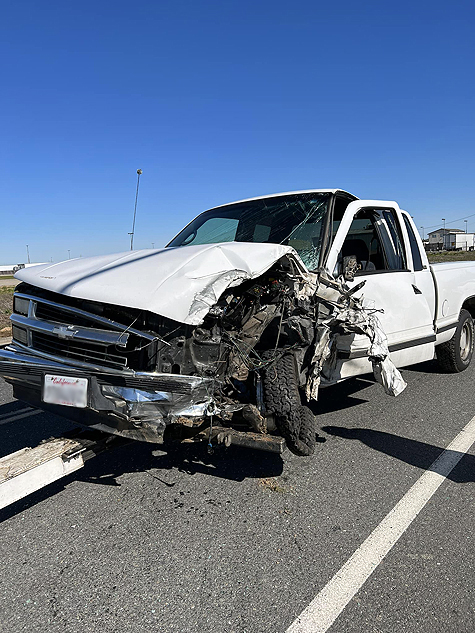EC Blog – I Am A Fixer
Accidents happen in a second, but the effects can be forever.
By Susan Marie Stidham, DVM
The end of a long and hard week, and only now can I write about it. Wednesday, I answered a hysterical phone call about a highway accident involving a horse trailer.
Some of you may have seen Linda Adger McLellan’s recent post. For those who haven’t, my client was hauling her beloved show mare to her trainer, another friend of mine, for a lesson. A few miles from her destination, while slowly accelerating away from an all-way stop sign, she had probably only reached 25 to 30 mph. She was traveling eastbound on a two-lane straight road, on a cold and clear sunny day, when a westbound truck veered across the center line and hit her horse trailer head on.
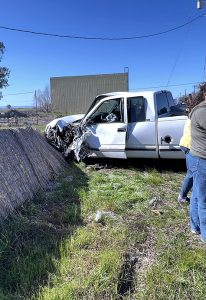 The force of the impact sheered the hitch and separated the trailer from the tow vehicle, crumpling the left side of the trailer, sheering the left front trailer wheel from the axle, and peeling off the left trailer fender. Skid marks on the road showed the trailer hitch gauging the road as it continued another 20-30 feet unattached to the truck. The offending driver’s truck ended up off the road well beyond the trailer.
The force of the impact sheered the hitch and separated the trailer from the tow vehicle, crumpling the left side of the trailer, sheering the left front trailer wheel from the axle, and peeling off the left trailer fender. Skid marks on the road showed the trailer hitch gauging the road as it continued another 20-30 feet unattached to the truck. The offending driver’s truck ended up off the road well beyond the trailer.
There was only one sweet mare in the three-horse slant trailer: Lexi. One lovely APHA mare that carried her adoring owner around the show ring to awards and memories.
I arrive to firetrucks and emergency personnel directing traffic around the obstructed lane. My friends, the owner and her trainer, are devastated. I open the rear trailer doors and climb in to verify that there is nothing I can do. My initial examination shows that Lexi suffered a catastrophic skull fracture and subsequent brain injury on impact, and mercifully died almost instantly. Her owner is crying, wandering aimlessly, unsure how to process her loss. She had run back to the eerily quiet trailer after the collision, hoping against hope that Lexi was okay.
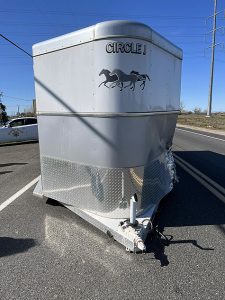 Instead, she found her down and bleeding, unmoving and not breathing, and then threw herself crying over her mare. If she could have willed her back to life, she would have. She was eventually coaxed out of the trailer. I hug her and hold her while she cries, and explain that her mare did not suffer, that the impact would have rendered her immediately unconscious. But my heart is breaking for her.
Instead, she found her down and bleeding, unmoving and not breathing, and then threw herself crying over her mare. If she could have willed her back to life, she would have. She was eventually coaxed out of the trailer. I hug her and hold her while she cries, and explain that her mare did not suffer, that the impact would have rendered her immediately unconscious. But my heart is breaking for her.
The driver of the other truck is over by his vehicle, uninjured, apparently not impaired, speaking to emergency personnel. His truck is totaled, air bags deployed. Sadly, there were no airbags for Lexi. I can’t bring myself to walk over and talk to him.
I speak to the CHP, explain my findings, and discuss the logistics of moving the totaled horse trailer with the mare still inside. They call for larger tow trucks so that we can move the trailer off the road intact. I make sure that my distressed client gets the information on the other driver and vehicle, as well as the case number for the accident report. A grief counselor arrives, and the trainer and I direct her to Lexi’s owner. The arriving animal control officer comes to speak to me to make sure there is nothing that I need from her. Another client driving by the scene sees me and stops to ask if I need her to bring her own trailer to transport my patient. I thank her and tell her there is nothing we can do. I intentionally don’t look at any of the cars driving by the wreck.
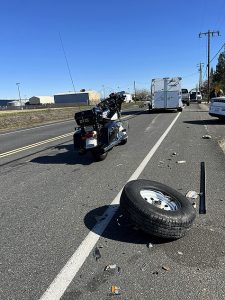 The tow truck drivers are professional; they remove the still attached wheel from the opposite side of the damaged front axle and manage to attach the mangled trailer to their rig. I follow the trailer the few miles to the training stable, where they unhook it, and I am finally able to remove my patient from the trailer and perform a full evaluation out of the sight of rubberneckers on the roadway. I hug my client again and ask her to go into the house before we remove the horse. I make mental notes for the accident record. I arrange for pickup and burial service, speak to the owner’s husband and son who have arrived. When all is arranged, I get back into the truck and head back to the clinic to meet another client with an emergency.
The tow truck drivers are professional; they remove the still attached wheel from the opposite side of the damaged front axle and manage to attach the mangled trailer to their rig. I follow the trailer the few miles to the training stable, where they unhook it, and I am finally able to remove my patient from the trailer and perform a full evaluation out of the sight of rubberneckers on the roadway. I hug my client again and ask her to go into the house before we remove the horse. I make mental notes for the accident record. I arrange for pickup and burial service, speak to the owner’s husband and son who have arrived. When all is arranged, I get back into the truck and head back to the clinic to meet another client with an emergency.
And then I cry. All this time that I held it together, staying strong and professional in the face of great grief. But I can’t any longer. In the solitude of the truck, I cry. Uncontrollably. Because I hurt for my friend and my patient. And I know that it will be a long time before she can move on.
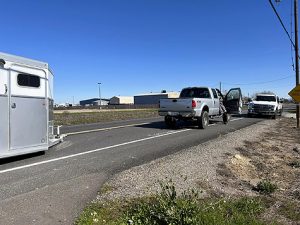 I am a “fixer”. And now I am overwhelmed with what we call “compassion fatigue.” But I have to pull myself together for my next patient.
I am a “fixer”. And now I am overwhelmed with what we call “compassion fatigue.” But I have to pull myself together for my next patient.
Bless all of you who love your animals. May you never experience the grief of such a sudden and violent loss.
(I have included only carefully selected photos of the accident scene, in order to encourage people to be careful. Accidents happen in a second, but the effects can be forever.)










